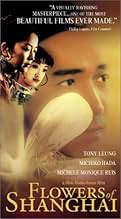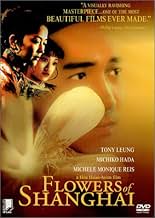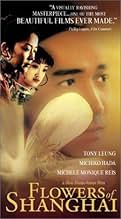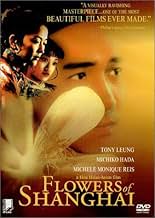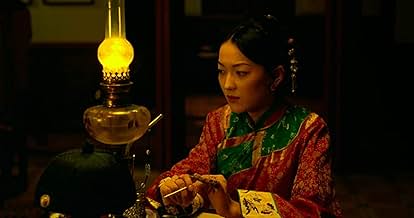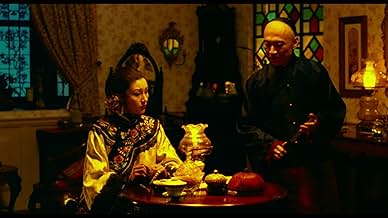AVALIAÇÃO DA IMDb
7,3/10
4,4 mil
SUA AVALIAÇÃO
Adicionar um enredo no seu idiomaIn the "flower houses" (upscale brothels) of Shanghai, various interweaving stories of love, loyalty, and deceit play out subtly.In the "flower houses" (upscale brothels) of Shanghai, various interweaving stories of love, loyalty, and deceit play out subtly.In the "flower houses" (upscale brothels) of Shanghai, various interweaving stories of love, loyalty, and deceit play out subtly.
- Direção
- Roteiristas
- Artistas
- Prêmios
- 6 vitórias e 6 indicações no total
Tony Leung Chiu-wai
- Wang Lingsheng
- (as Tony Chiu Wai Leung)
Michelle Reis
- Emerald
- (as Michelle Monique Reis)
Carina Lau
- Pearl
- (as Carina Lau Ka-ling)
Rebecca Pan
- Huang
- (as Rebecca Pan Wan-ching)
Tony Chang
- Peking Opera Actor
- (as Tony Chang Ruei-che)
Yiu-Ming Lee
- Azhu
- (as Yu-ming Lee)
- Direção
- Roteiristas
- Elenco e equipe completos
- Produção, bilheteria e muito mais no IMDbPro
Avaliações em destaque
I have to disagree with the previous poster on this film, I thought it was fantastic and moving. It tells the stories of a set of turn-of-the century courtesans and their client in Shanghai. About 20 characters revolve in and out, yet the director has expertly chosen to focus on key moments and conversations. The movie never leaves the internal rooms of the brothels or "flower houses", and you feel a sense of the entrapped social circumstances that ensnares all the characters. The cinematography is beautiful, taking advantage of low-lighting and inner spaces.
This movie was absolutely brilliant.
It was filmed in a manner that makes it seem more realistic than most movies. Each frame is beautiful.
A note on dialect - This movie (with the exception of Leung to his mistress) is in Wu Chinese. Wu is hardly a minor language, spoken by well over 70 million people worldwide. It is spoken not only in Shanghai (the largest city in China) but the surrounding provinces, including such large cities as Suzhou and Wenzhou. It is actually more widely spoken than Cantonese and Taiwanese combined, making it the second-most-spoken variety of Chinese, dwarfed only by Mandarin. (70 million speakers is a lot of people; many national languages in Europe have fewer speakers) However, Wu is not spoken by as many overseas Chinese as are Cantonese, Mandarin, and Hokkien (aka Taiwanese, Minnan, etc), and for that reason less Westerners speak it. (in addition, Cantonese, Hokkien, and Mandarin are all the primary languages of at least one self-ruling political unit, even though the former two have less speakers than Wu)
This is the only well-known movie with dialogue primarily in Wu, and it is based on the 19th century Wu novel by the same name (except read as Wu).
It was filmed in a manner that makes it seem more realistic than most movies. Each frame is beautiful.
A note on dialect - This movie (with the exception of Leung to his mistress) is in Wu Chinese. Wu is hardly a minor language, spoken by well over 70 million people worldwide. It is spoken not only in Shanghai (the largest city in China) but the surrounding provinces, including such large cities as Suzhou and Wenzhou. It is actually more widely spoken than Cantonese and Taiwanese combined, making it the second-most-spoken variety of Chinese, dwarfed only by Mandarin. (70 million speakers is a lot of people; many national languages in Europe have fewer speakers) However, Wu is not spoken by as many overseas Chinese as are Cantonese, Mandarin, and Hokkien (aka Taiwanese, Minnan, etc), and for that reason less Westerners speak it. (in addition, Cantonese, Hokkien, and Mandarin are all the primary languages of at least one self-ruling political unit, even though the former two have less speakers than Wu)
This is the only well-known movie with dialogue primarily in Wu, and it is based on the 19th century Wu novel by the same name (except read as Wu).
The Taiwanese writer-director Hou Hsiao-hsien is regarded by many as the greatest living filmmaker, and FLOWERS OF SHANGHAI is widely considered one of the strongest contemporary movies. Hou's approach is both anthropological and highly formalized: this examination of the economics and Machiavellian power politics of a Shanghai brothel in the mid-1800's stays remote. The feeling is sometimes that of a news crew eager not to intrude, but the mise-en-scene evokes the mastery of space-carving in Kurosawa's HIGH AND LOW or Bresson's UNE FEMME DOUCE. Shot in wide, mobile masters that go on for four or five minutes at a stretch, FLOWERS is theatrical in the extreme, and, as in a Yuan drama or a Kun opera, Hou stays at a more than respectful reserve from his characters. For some, this spells high-art elegance; others may feel starved for vividness and human immediacy, and wish the film to end far sooner than it does.
First, a disclaimer: I love so-called "art films", from Cocteau and Eisenstein to David Lynch and Krystof Kieslowski. I have a long attention span and am willing to extend considerable effort towards appreciating any work of art.
Having said that, The Flowers of Shanghai was largely a disappointment. Yes, the sets and costuming are sumptuous. True, the mood evoked by the film is seductive. And the subject matter--the relationships between courtesans and their clients--is at least provocative. But for a number of reasons, Hou fails to deliver a film that rises above those elements.
The reasons are many. First, the plot is minimal--hardly compelling--mostly relying upon the petty machinations between the courtesans and the clients who try not to become too involved with them. But such a minimal plot can only engage if we become involved in the characters, and this is very difficult to do.
That's problem number two: the characters simply aren't compelling. The men tend to be equivocal and emotionally distant. The women tend to be shallow and manipulative. Since there are essentially no close-up shots, and the physical expressions are very restrained, we have no sense of people's emotional states. There is not one character that we can really care about.
Third: the editing is leisurely. Really leisurely. Glacial. Very few directors can pull off a five minute interior shot with almost no dialogue or action; Ozu was one. But Hou--although better than many contemporary directors--isn't up to Ozu's level by a long shot. Hou's scenes, unlike Ozu's, don't so much engender our contemplation as they engender tedium. A director has to be able to recognize when a scene has come to the end of its life; this he doesn't seem to be able to do.
A note to the curious: every shot in this film is an interior shot; you never see the outdoors--not even the sky through the windows. And despite the subject matter and the warnings of adult content on the box, there are no sex scenes; there is no nudity. Structure-wise, the film depicts three activities: men playing "rock, paper, scissors" around a table, people having their little dramas in private, and people brooding.
That's basically it.
I would like to be able to say that The Flowers of Shanghai was more than just a 2-hours-plus visual curiosity, but it simply isn't. And more the shame because of its wasted potential.
Having said that, The Flowers of Shanghai was largely a disappointment. Yes, the sets and costuming are sumptuous. True, the mood evoked by the film is seductive. And the subject matter--the relationships between courtesans and their clients--is at least provocative. But for a number of reasons, Hou fails to deliver a film that rises above those elements.
The reasons are many. First, the plot is minimal--hardly compelling--mostly relying upon the petty machinations between the courtesans and the clients who try not to become too involved with them. But such a minimal plot can only engage if we become involved in the characters, and this is very difficult to do.
That's problem number two: the characters simply aren't compelling. The men tend to be equivocal and emotionally distant. The women tend to be shallow and manipulative. Since there are essentially no close-up shots, and the physical expressions are very restrained, we have no sense of people's emotional states. There is not one character that we can really care about.
Third: the editing is leisurely. Really leisurely. Glacial. Very few directors can pull off a five minute interior shot with almost no dialogue or action; Ozu was one. But Hou--although better than many contemporary directors--isn't up to Ozu's level by a long shot. Hou's scenes, unlike Ozu's, don't so much engender our contemplation as they engender tedium. A director has to be able to recognize when a scene has come to the end of its life; this he doesn't seem to be able to do.
A note to the curious: every shot in this film is an interior shot; you never see the outdoors--not even the sky through the windows. And despite the subject matter and the warnings of adult content on the box, there are no sex scenes; there is no nudity. Structure-wise, the film depicts three activities: men playing "rock, paper, scissors" around a table, people having their little dramas in private, and people brooding.
That's basically it.
I would like to be able to say that The Flowers of Shanghai was more than just a 2-hours-plus visual curiosity, but it simply isn't. And more the shame because of its wasted potential.
10dave-593
Hou Hsiao-Hsien's "Flowers of Shanghai" is an opium dream of a movie: visually and aurally there is no mistaking that this is the work of an artist with the imagination of a poet, and the precision of a clockmaker. The opening shot is among the most exquisite in all of cinema: a veritable tour de force that exudes Hou's love for the film medium, but is decidedly restrained and controlled, never allowing style to upstage the narrative and degenerate into mere spectacle. In keeping with the film's setting and rules of patriarchy, the major male characters are introduced first. The women serving these men are then introduced in the following "chapters", each one preceded by title cards announcing their names and place of residence as if gently mocking or subverting the patriarchical order.
This chamberpiece drama of sexual intrigue and power struggle is astonishingly acute in capturing the feel and sensibilities of the late 19th century but expressed in very contemporary terms without any apparent compromises or contradictions. The painterly colors of "Flowers" may invite comparison with Dutch masters like Vermeer even when Hou is deliberately conjuring an idealized world that is as hermetic as it is artificial: a world composed entirely without natural light is like a dream, hauntingly beautiful and intense but impossible to hold or to keep. That the film is shot entirely indoors and the mise-en-scene is orchestrated without any close-ups is a testament of Hou's faith and supreme confidence in creating a work that remains completely cinematic while averting the pitfalls of feeling stage bound. Despite the subject matter what is also startling is the complete absence of physical sex on screen; and, yet the film manages to sustain an erotically charged atmosphere.
Beginning with "The Puppetmaster" Hou has been increasingly moving towards a more minimalist form of cinema, stripping the narrative of everything that is superfluous until nothing is left but its emotional core, naked and unadulterated. "Flowers" is very much an interior film that does not depend on voiceover narration to make thoughts explicit. Hou's almost static camera continues to favor long medium takes ranging from 5 to 7 minutes, framing key characters sharing the same space and time, but well within reach of each other, capturing the subtle interplay and nuances while allowing them to drift in and out of the picture frame according to their relative importance in the social hierarchy. In this manner an entire community is evoked: demonstrating that the window to the world is precisely through the interior lives of individuals responsible for shaping the body politic.
This chamberpiece drama of sexual intrigue and power struggle is astonishingly acute in capturing the feel and sensibilities of the late 19th century but expressed in very contemporary terms without any apparent compromises or contradictions. The painterly colors of "Flowers" may invite comparison with Dutch masters like Vermeer even when Hou is deliberately conjuring an idealized world that is as hermetic as it is artificial: a world composed entirely without natural light is like a dream, hauntingly beautiful and intense but impossible to hold or to keep. That the film is shot entirely indoors and the mise-en-scene is orchestrated without any close-ups is a testament of Hou's faith and supreme confidence in creating a work that remains completely cinematic while averting the pitfalls of feeling stage bound. Despite the subject matter what is also startling is the complete absence of physical sex on screen; and, yet the film manages to sustain an erotically charged atmosphere.
Beginning with "The Puppetmaster" Hou has been increasingly moving towards a more minimalist form of cinema, stripping the narrative of everything that is superfluous until nothing is left but its emotional core, naked and unadulterated. "Flowers" is very much an interior film that does not depend on voiceover narration to make thoughts explicit. Hou's almost static camera continues to favor long medium takes ranging from 5 to 7 minutes, framing key characters sharing the same space and time, but well within reach of each other, capturing the subtle interplay and nuances while allowing them to drift in and out of the picture frame according to their relative importance in the social hierarchy. In this manner an entire community is evoked: demonstrating that the window to the world is precisely through the interior lives of individuals responsible for shaping the body politic.
Você sabia?
- CuriosidadesThe film consists of 38 long shots.
- ConexõesFeatured in Hai shang chuan qi (2010)
Principais escolhas
Faça login para avaliar e ver a lista de recomendações personalizadas
- How long is Flowers of Shanghai?Fornecido pela Alexa
Detalhes
Contribua para esta página
Sugerir uma alteração ou adicionar conteúdo ausente


